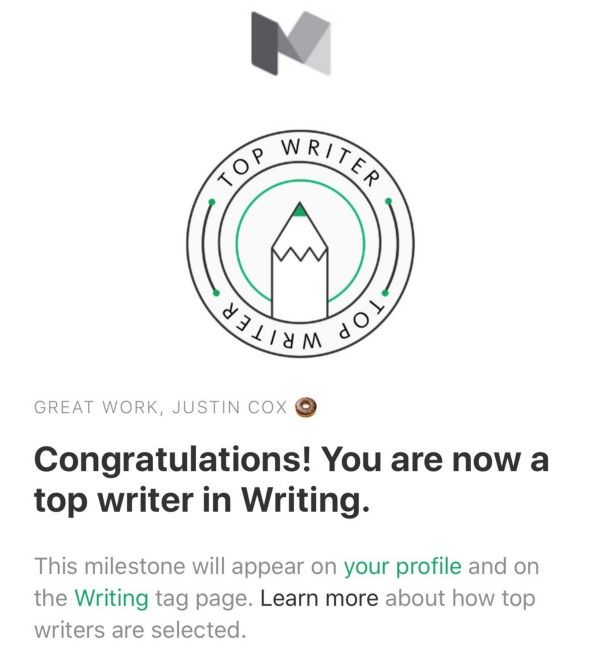Seeking Validation
Just Click the Heart Button Already

Justin, we greatly appreciated meeting with you today. We enjoyed your proposal and will be in touch soon. Thank you again. -Marketing Firm
This email is from a marketing firm in London. It’s not spam. It’s a legitimate email of gratitude following a pitch meeting.
The problem is I wasn’t at that pitch meeting. Nor was I in London. Nor am I in marketing.
I am not the Justin Cox they’re looking for.
I get an email like this every few weeks. The other day I got one from the concierge at a hotel in Dubai thanking me for my visit. A month or so ago it was a Mercedes dealership in Southern California thanking me for choosing them for my vehicle’s service needs. A few months ago it was an HR director thanking me for interviewing with their marketing company.
There’s another Justin Cox out there who, on occasion, forgets their email address and uses mine. I imagine they neglect a period or a number or that little underline or something. As a result, I get correspondence intended for them.
I have no idea who this Justin Cox is or where he lives. On Black Friday I thought I hit the jackpot when I recieved a shipment notification from the Gap. I was ready to write an old school letter and let the imposter know to stop using my email address. Unfortunately there was no mailing address in the receipt to protect my privacy.
This jet-setting Justin Cox is going around using my email address. Sometimes I reply to the sender, inviting them to use another form of contact to get who they’re really looking for. Most of the time I just delete it.
As a result, neither the impostor nor myself is really known by the people sending the emails. We’re just faceless people at the other end of the screen.
I’ve attempted to verify my Twitter account a few times over the last couple of months. The process involves filling out a form, listing some “relevant links,” and waiting for a response.
The response is always the same, “We have reviewed your account and it cannot be verified at this time.” I’m invited to apply again in 30-days.
Originally I attempted Twitter verification because I wanted to distinguish myself from the other Justin Cox’s out there. I wanted to validate that I was the Justin Cox and that guy flying around the globe making proposals to marketing firms is just some second-rate imposter.
I continue to fill out the verification form every 30 days or so. Part of me wonders if Twitter will just give up and click the “verified” button. The truth is I’m seeking the validation from that elusive checkmark badge.
We’ve been conditioned to seek validation in all forms. When I hit publish on this story, I’m conditioned to seek out how many ‘hearts’ it gets by refreshing the stats page every twenty-seven seconds. When I post an update on Twitter, I’m conditioned to look for retweets. Facebook brings likes. Instagram has their hearts. Snapchat has streaks.
The gamification of our lives has conditioned us to care about things like leaderboards and hearts and little badges on our Twitter accounts.
I just finished reading The Circle by Dave Eggers (coming to theaters in April with an amazing cast including the now late Bill Paxton). It’s a fictional tale of how this constant need for validation can literally kill us. While I don’t think we’re quite to the dystopian future The Circle depicts, we’re not that far off.
I shouldn’t care about a verified badge, but for some reason I do. I shouldn’t care that this other Justin Cox is out there staying at a hotel in Dubai while I get the post-stay emails at my desk. But I do.
Using the tools that help to make our lives easier and more enjoyable just sets us up to crave constant validation from other people. From strangers.
It’s time to break the cycle… or the circle. It’s time to break the constant need for validation, from obsessing over stats and follower counts.
I realize that this won’t be easy. The grip of caring about statistics and hearts and getting emails intended for another Justin Cox is very strong. But for my sanity, I have to let some of it go.
I’m not taking the blue pill and adopting an ignorance is bliss mentality — I’d still like to know what hits and what doesn’t — I’m just going to resist my initial reaction to constantly seek validation from people on the internet.

The irony is that I’ve been working on this story off and on for over a week now, trying to get the wording just right while I wrestle with the concept in my head. Last night I get an email from Medium announcing that I’ve been named a Top Writer in the Writing and Short Story categories. That’s a big ol’ heap of validation that caused me to start obsessing over the stats once again.
All of a sudden I was rethinking this whole concept. My mind immediately processed that this kind of recognition might help with Twitter verification. I was right back where I had started.
Don’t get me wrong, I’m extremely grateful to be recognized in this way. But it shows how conditioned I’ve become to seek this type of validation. Instead of taking a moment to enjoy the honor, my mind started trying to find ways to leverage it into the next thing.
Is it really the end of the world if my Twitter account is never verified? Will I lose any sleep if this story only get’s three recommends? No. So why should I fret over these things constantly?
In today’s world, there are much more important things to stress over.

